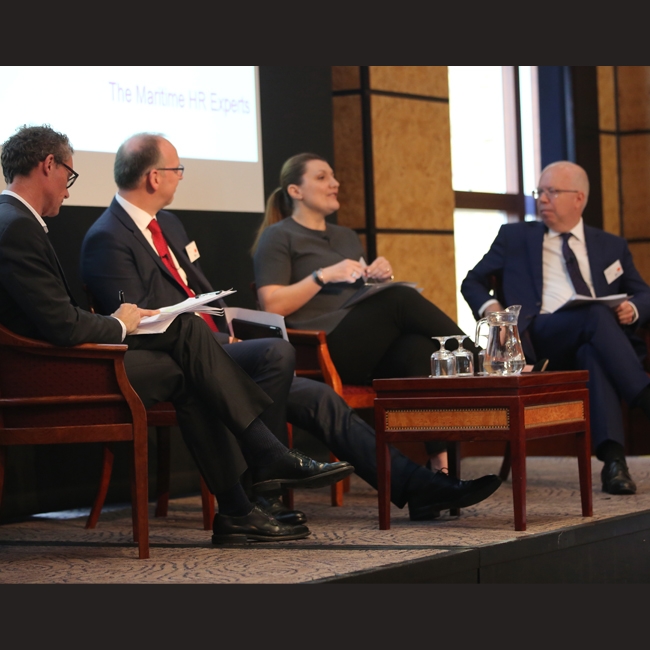“You can plan in shipping, but it changes quickly, so you have to be adaptable.” – Stephen Gordon of Clarksons Research kicked off the 12th annual Maritime HR conference in London on 24 May, and set the tone on what ended up being an unofficial theme of the 2-day event: adaptability.
Flashback to 2016 and the shipping economy was at an all-time low. Surplus capacity was a millstone around the industry’s neck, there was Hanjin, low Baltic Dry and ClarkSea indexes… I don’t need to go on, you’ll remember it well. It’s not over by any stretch; the tanker market is still very tough, as is LPG, bulk carriers are on the up but volatile – but containers are recovering. LNG is starting to improve. Ro-ro is a good, stable market in 2018. Just like Gordon said, shipping changes fast.
We went future-gazing with Heidi Watson, Clyde & Co, looking at how technology in maritime will impact on HR. As Karen Waltham put it in the conference programme, “Before we relinquish control to the robots entirely, autonomous ships are still very much a people issue.” Autonomous ships, big data and robotics seem to be on everybody’s lips, but is that just media noise? Not so, as it was revealed that 82% of executives surveyed by Clyde & Co already have automation initiatives under way – and it will have to involve new staff (so it’s not just a redundancy story). It goes back to the fact again that shipping is, in Watson’s words, a “rapidly shifting landscape”.
So how do we manage this change? When we’ve gone from fax machines and paper trails to ‘robot tax’ and drones in less than two decades, we’re struggling to catch up with new tech. We’ll need new staff – as one of the delegates put it “young people who grew up with iPads in their hands, not pencils.” Watson also noted that this could be a golden opportunity for women to be attracted to the industry as tech roles are shorebased – no vessel time. It’s all very easy to say “be adaptable” but how do we get senior staff on board when they grew up in starkly different environments to their new recruits? The message from Watson was very much: “Educate your senior teams. The maritime industry is going to be transformed.”
The conference’s CEO panel (pictured) on attraction and retention in shipping continued this message, with input from Charles Maltby, Epic Gas, Despina Panayiotou Theodosiou, Tototheo Maritime and Simon Swallow, Shipowners' Club, all chaired by Julian Bray, TradeWinds. “Shipping is a rewarding industry,” said Despina Panayiotou Theodosiou, “but you have to be ambitious, agile, and a risk taker… The industry has a reputation of being very conservative – but this is changing.” With a changing tide, senior teams really do need to get up to speed and quickly. There is a gulf between senior teams and young employees as discovered by Simon Swallow at Shipowners Club: the former tend to put work-life balance lowest on a list of work priorities, but millennials put it at the top. Managers who have spent their careers behind their desks before 9am and after 6pm are having to accept new ways of working – flexibly, remotely, digitally. Yes, younger staff have to respect that their managers have worked in the same way for most of their lives (“work life balance” wasn’t even a phrase 30 years ago), but older management need to adapt for harmony to ensue.
Aside from adaptability, diversity was also a hot topic at the maritime HR conference. As Charles Maltby raised, how effective can a company be if you only employ the same kinds of people from the same schools and colleges? Diversity is key. As Maltby later said: “Ships should be capable of taking anybody on them. We need to make this happen.” And of course, the topic of attracting women into the industry is always a thread at events like this. In a group discussion, delegates discussed that if young women don’t see characters on TV or in advertising working in ports, on ships, in the industry, then they won’t associate it as a career option for women. If shipping is getting ready for automation, it needs to be fully diverse and inclusive too. It brings us back to the question of adaptability – it’s essential for the future of the industry. It is no longer a case of ‘if’ shipping will change, but ‘when’.

